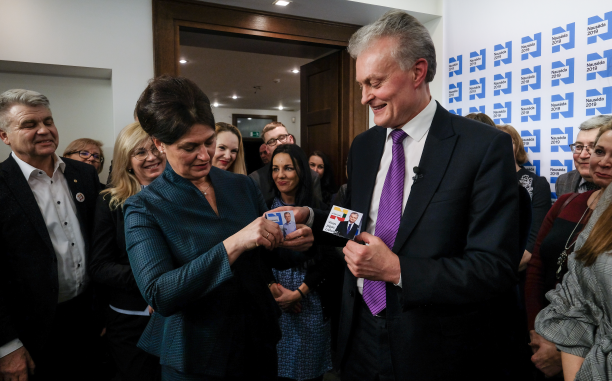
Lithuania is certainly not among the main players in international politics, where everyone is primarily self-interested. Thus, the country has to be particularly active and wise, otherwise, we may be left standing around regretfully at the train station, watching the trains we missed departing. Or perhaps buying sedatives, Vytautas Bruveris writes in lrytas.lt
The cabinet intends to buy large amounts of iodine tablets, which are to be distributed to citizens in order to protect them from radiation in case there is a catastrophe in Astravyets Nuclear Power Plant.
Such publicly announced news, which could incite the citizens’ fear is perhaps also intended for the international audience as well in order to emphasise that this Belarusian-Russian power plant is unsafe.
One way or another, Astravyets NPP is essentially done being built and should soon be launched.
This is what President G. Nausėda was left to conclude when he visited Germany last week.
This visit by G. Nausėda was essentially successful, even if more symbolical. The most important result is a display that the relations of Lithuania and Germany are stable and close.
Of course, the president simply had to remind the leaders of the most influential EU member state the main geopolitical worries Lithuania has.
The Germans politely listened and nodded.
The Lithuanian head of state also reminded German Chancellor A. Merkel of our worries about Astravyets NPP.
An ironic coincidence – namely at the same time, news emerged that Latvia, where G. Nausėda visited recently, intends to buy electricity produced in Astravyets and if Lithuania blocks it through its own networks, the Latvians will purchase power themselves.
G. Nausėda declared that this move from our neighbours is not like a bolt from the blue – such intentions were known beforehand.
That said, on August 15, Latvian Prime Minister K. Karinis stated that his country has yet to make a decision on buying electricity from Belarus and that this earlier news is just a misunderstanding.
By the way, talking about Astravyets NPP, G. Nausėda also nudged our former governments.
Initially, they tried to deny the reality of this project entirely, afterwards even tried to flirt with the Minsk regime and form mutual energy policy.
G. Nausėda reminded that the former Conservatives government even signed a special communique with Belarus when President D. Grybauskaitė sought closer relations with A. Lukashenko and his regime.
In other words, the president could only speak up about how the continuing militant slogans of certain politicians, particularly on the right, regarding halting the construction of Astravyets NPP are just empty words.
The very most Lithuania can do is seek international pressure on Minsk so that it would ensure the power plant’s security.
However, are our European Union partners prepared to apply pressure? What can and what have Lithuanian politicians done so that there would be as much resolve as possible?
These are questions for the ever brighter new star in our political skies – R. Masiulis.
This figure started his political career under the Conservatives’ wing in the energy sector, becoming the minister of energy in a leftist cabinet under the Labour Party banner and Minister of Transport and Communications with the “Farmers”.
That the office of minister of transport and communications would be stripped from him finally emerged in the last days of the cabinet’s reshuffle.
Having not retained R. Masiulis, the president predicted for him a political career in the saddle of a new party or movement. In recent days, R. Masiulis himself also confirmed his intent to turn to politics.
Agilely adapting to the various colours of the ruling party, R. Masiulis based his activities on the faithfully crafted image of a transparent and unbreakable fighter against corruption.
It is nothing weird that as soon as he felt that the “Farmer” leadership wants ridding of him, the minister began declaring that dark forces he has crossed seek to remove him.
R. Masiulis performed another public relations stunt last week. He explained he earlier did not know or understand what sort of figure R. Karbauskis is and who he had to walk alongside, but now his eyes were opened.
The “Farmer” leader was quick to respond, retorting that R. Masiulis is a hypocritical gossip because in the Ministry of Transport and Communications he led, as well as the sector that it supervises, there is a rife disorder, which shocked the parliamentary majority.
It sounds curious, when one of the most advertised representatives of the professional’s cabinet and the leader of the party that formed said cabinet exchange such discoveries about one another at the same time three years down the line.
But would R. Masiulis and the “Farmers” be rivals if the former minister turned to politics?
If he ran as an independent in the Seimas elections, it is clear he would primarily compete with the Conservatives.
In other terms, those, who always expressed the most fervent love for this protégé of D. Grybauskaitė, should seek to draw him to their camp.
Finding himself atop the Conservatives’’ electoral roll alongside another non-partisan new star of theirs I. Šimonytė, R. Masiulis would be a major extra injection for a party constantly declaring renewal and the search for new voters.
Nevertheless, the decision will be made by the most desirable political bachelor. Will he choose to be an independent player or an expensive recruit in the right-wing regime – that matters little.
Instead, an old principle of Lithuanian politics will be proven – both figures never seen before on the political scene and those, that have worn out many a pair of shoes in it, but reimagined drifters can become new saviours or stars.


Be the first to comment